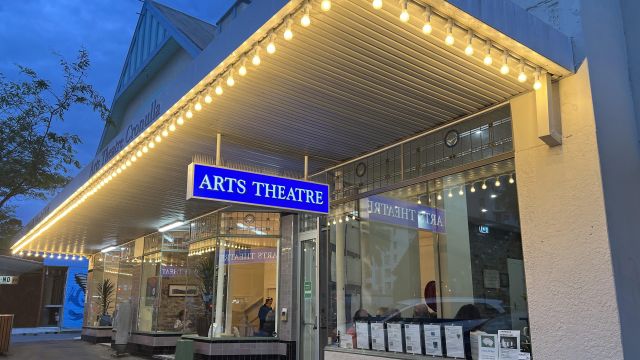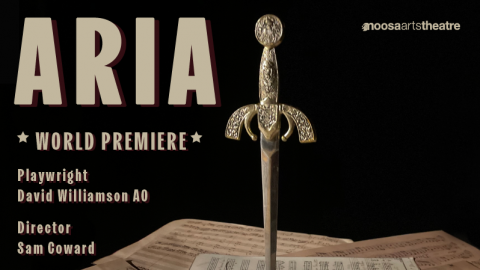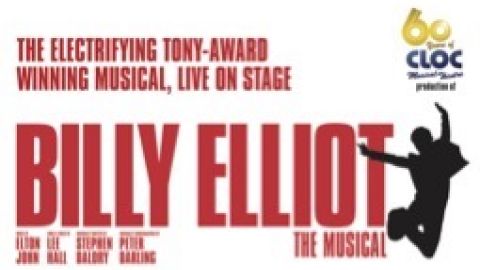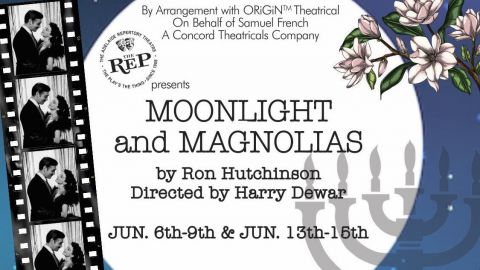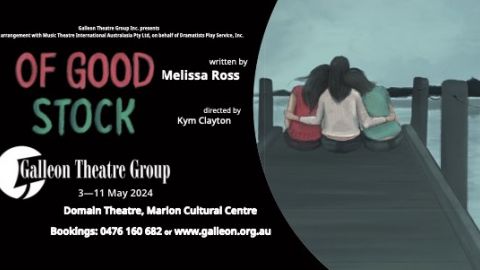Celebrating Sixty Years of Theatre at Cronulla
As Arts Theatre Cronulla turns 60 in 2023, Publicity Officer Michele Potter shares the theatre company’s history.
Arts Theatre Cronulla is thrilled to be celebrating its 60th anniversary in 2023. Through a formula of good plays, high production values and talented performers, ATC enjoys continuing success as a community theatre group after six decades, with a wealth of productions and experiences enjoyed by cast, crew and audiences alike.
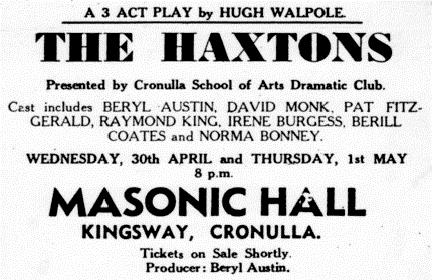
The foundations for success stem from 1946, with a dream and desire by a dedicated group of thespians to create a place where plays could be performed for the community’s enjoyment. At the Annual General Meeting of the Cronulla School of Arts that year, it was resolved to form clubs within the organisation, and the Cronulla School of Arts Dramatic Society was born. During its first eleven years the group presented 20 plays, the first being The Haxtons in 1947, performed at the Masonic Hall and then Sutherland School of Arts as there was no permanent home.
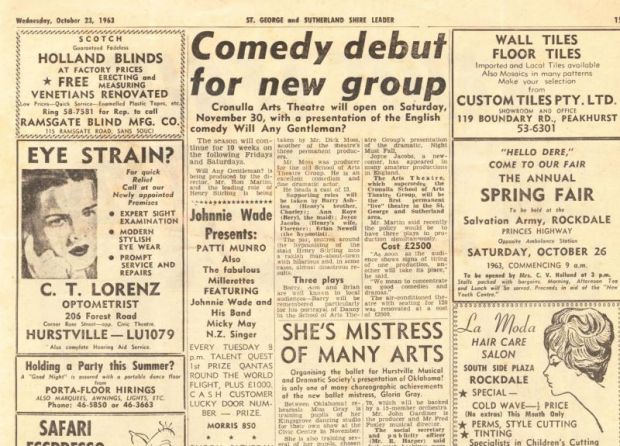
A major development came in 1958 when the group changed the name to the Cronulla School of Arts Theatre Group and built a stage in the hall of the current School of Arts building in Surf Road. As the group had not yet been licensed for public performances, the audience was restricted to members and it was to be another four years before the theatre obtained the requisite licence. Finally, in November 1963, the theatre, under its new name, Arts Theatre Cronulla, opened for its first public production, Will Any Gentleman?
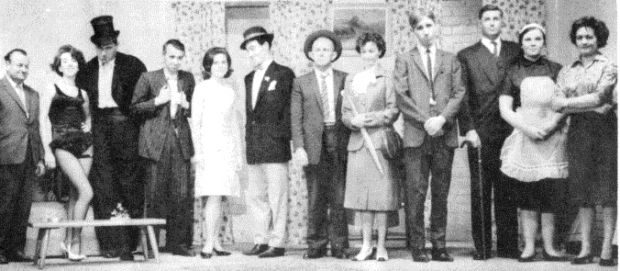
Image: Will Any Gentleman?
The long-term success of the theatre was not immediately secured, as finances were tight and widespread advertising was not an option. Theatre members were often seen parading down Cronulla Street in costume handing out tickets and attempting to attract audiences. However, the high quality of productions was demonstrated by theatre’s first entry in the Sydney Drama Festival in 1965. The Shifting Heart gained the trophy for best production of an Australian play. The 1967 entry, Flowers for the Living, gained the Best Actress award and theatre’s only other entry in the Drama Festival, Duet For Two Hands in 1968, earned the Best Producer award.
The area of the building occupied by the theatre has expanded gradually over the years. The original cast dressing area in the 1960s was in the wings of the stage. In the 1970s the room at the back of the stage was built as a dressing room, then in the late 1980s, the theatre took over two adjacent shops, enabling an enlarged dressing room, with showers and toilet facilities built for the cast in the 1990s.
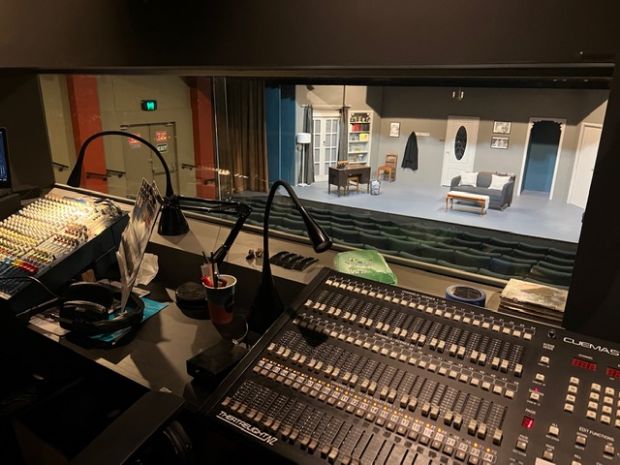
The theatre has always prided itself on the all-inclusive price of admission, which covers interval refreshments, a program and a light after-show supper on weekends. The original ticket price when ATC was established was eight shillings, rising to $1.00 in 1966 when decimal currency was introduced and gradually increasing to the current $27 for Wednesdays and matinees and $30 for Fridays and Saturdays.
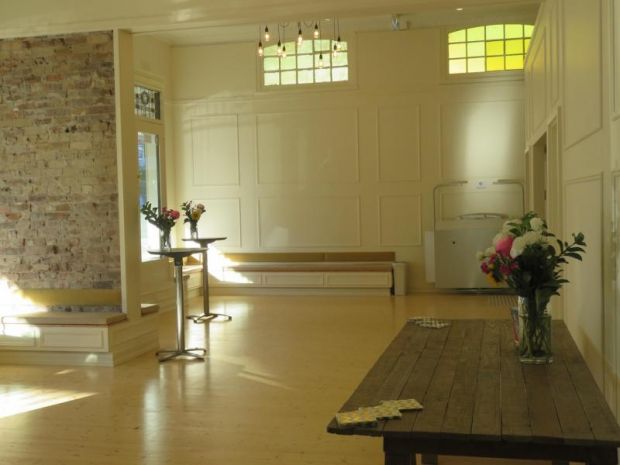
The theatre has traditionally enjoyed loyal support from audiences, with many sell-out productions and strong volunteer numbers. ATC was selected as a runner up in the 2011 Sutherland Shire Community Group of the Year Awards, a testament to its standing in the local community.
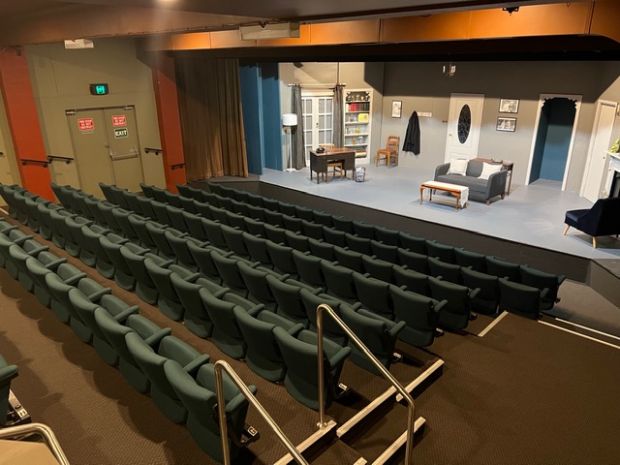
Many initiatives over the years have kept the theatre up to date and progressive, including building improvements, equipment upgrades and new performance opportunities for actors, maintaining the balance required to remain relevant to our community and continue to attract new audiences.
· A major renovation to the heritage-listed building was completed in 2011/12, with theatre reserves and a government grant of $100,000 funding a major portion of the work. This project brought the building into compliance with building and fire regulations and saw the installation of a lift to enable full access to the upper floor. Further major building work was completed in 2018, including a new tech box and associated major upgrades to sound and lighting equipment. The foyer was expanded and enhanced with décor sympathetic to the art deco period of the building’s original construction.
· A sub-group of the theatre named Bareboards was introduced in 2009 to provide acting and backstage opportunities for members who are unable to commit to a major production. Bareboards has developed excellent initiatives and expansion of the original concept, with Crash Test Cronulla now an integral part of our theatre’s annual calendar, where winners gain automatic entry into the Sydney Short+Sweet Festival.
· The theatre’s first drama school was established In 1966, with current adult drama classes continuing to attract strong enrolments, and youth drama classes have recently been introduced. The curriculum is based on a 4-term year, with participants able to move on to roles in theatre productions either on stage or as part of backstage crews.
· A gold coin donation was introduced for preview performances in 2010, with the theatre matching the amount raised, and proceeds being donated to the director’s charity of choice.
· Members of fellow School of Arts group the Port Hacking Camera Club take production photos for our shows, providing a mutually beneficial arrangement for both parties.
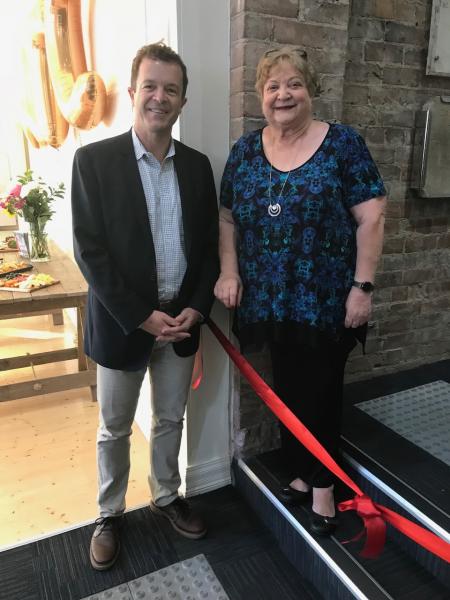 Image: Local MP Mark Speakman opens the renovated theatre in 2018.
Image: Local MP Mark Speakman opens the renovated theatre in 2018.
The success of Arts Theatre Cronulla has been built on the establishment of a theatrical tradition that has continued to flourish due to the selfless dedication of a troupe of volunteers comprised of actors, directors, technicians, backstage crews, front of house and box office staff. Despite the repeated interruptions to performances for all theatres over the past few years due to the Covid-19 pandemic, a committed management committee oversees the totality of operations and is leading the theatre confidently into its seventh decade.
www.artstheatrecronulla.com.au
For this anniversary year, the theatre is staging four diverse plays. First is David Williamson’s classic comedy, Dead White Males. This play takes a satirical look at postmodern literary theory and was written in response to an academic paper on post-structuralism that Williamson found incomprehensible. The appearance of William Shakespeare features as a motif throughout the play.
Next is the hilarious The Appleton Ladies’ Potato Race, written by Melanie Tait, whose family is the most recent owner of ‘The Big Potato’ in Robertson NSW. This funny, honest and heart-warming story is based on the real situation where it was found that the prize money for women in the famed annual potato race was significantly lower than the men’s, and the subsequent quest to attain parity.
The third production is Things I Know to be True by Andrew Bovell. The play highlights the spectrum of love in its many forms, at times comforting and supportive and at others suffocating and destructive. We observe the struggles of Adelaide’s Price family, and learn that when life doesn’t go according to plan, a web of complicated family relationships can be exposed.
Finally, the year ends with a laugh, where A Fox On the Fairway by Ken Ludwig will take audiences on a hilarious romp set amid the leafy greens of the private Quail Valley Country Club. Filled with mistaken identities, slamming doors, and over-the-top romantic shenanigans, this is a furiously paced comedy that recalls the Marx Brothers classics.
Subscribe to our E-Newsletter, buy our latest print edition or find a Performing Arts book at Book Nook.

